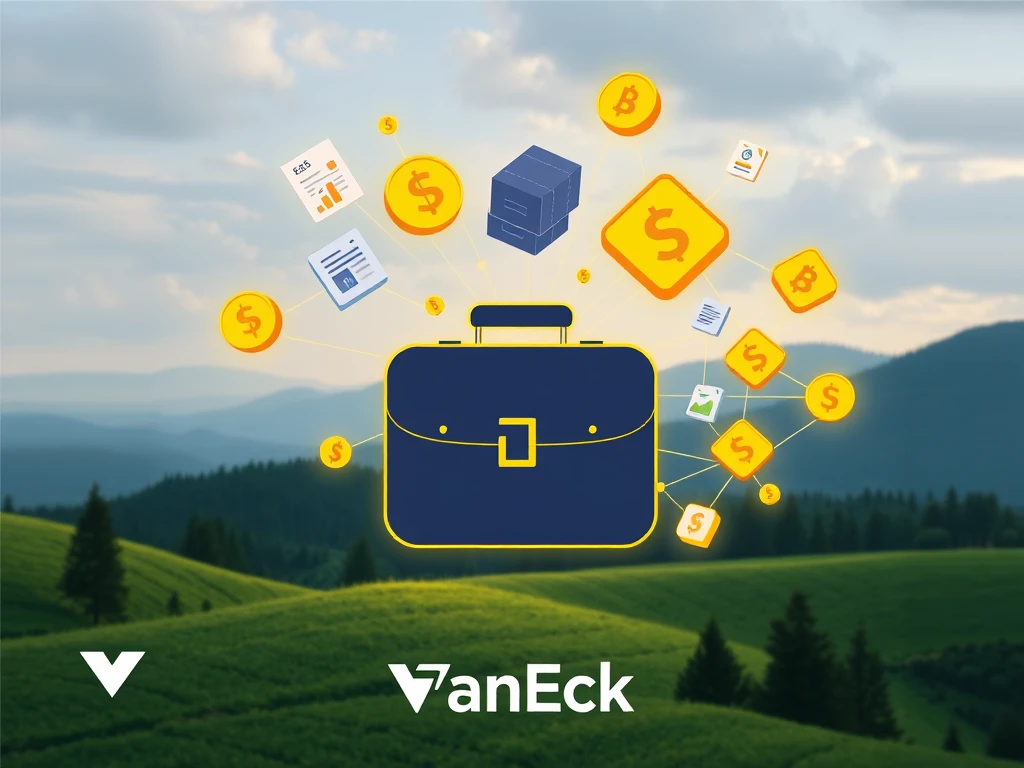RWA Tokenization Sees Major Boost as VanEck Launches Fund

The world of traditional finance and decentralized technology continues to converge, and a significant development is making waves: RWA tokenization. Investment giant VanEck has officially stepped into this arena, launching its first tokenized fund. This move signals increasing confidence from major players in the potential of blockchain technology to revolutionize asset management and distribution.
RWA Tokenization: A Growing Trend
Real-world asset (RWA) tokenization involves placing ownership rights or value of physical or traditional financial assets onto a blockchain. This process creates digital tokens that represent assets like real estate, art, commodities, or, as in this case, financial instruments like US Treasury bills. The market for tokenized assets is expanding rapidly, attracting attention from both crypto natives and established financial institutions.
Advocates highlight several key benefits of RWA tokenization:
- Increased Liquidity: Tokenization can break down large, illiquid assets into smaller, tradable units.
- Faster Settlement: Transactions can settle significantly faster compared to traditional systems.
- Greater Transparency: Ownership and transaction history can be immutably recorded on a public or private ledger.
- Reduced Costs: Streamlined processes can potentially lower administrative and intermediary costs.
This trend is transforming how investors access and interact with various asset classes.
VanEck’s Bold Move into Tokenized Assets
VanEck, a well-known investment firm with a history of embracing digital assets (like their Bitcoin ETFs), has launched its first tokenized fund. The fund, named VBILL, is designed to provide exposure to US Treasury bills. This initiative was developed in partnership with Securitize, a platform specializing in asset tokenization.
The VBILL fund demonstrates VanEck’s commitment to exploring blockchain-based solutions for traditional investments. By tokenizing exposure to US Treasuries, VanEck aims to leverage the efficiencies and potential benefits offered by distributed ledger technology for its clients.
Initial availability for the VBILL fund includes deployment on multiple prominent blockchains:
- Avalanche
- BNB Chain
- Ethereum
- Solana
This multi-chain approach indicates a strategy to reach a broad base of potential investors within the digital asset ecosystem.
Competing in the Institutional Crypto Space
VanEck’s new RWA tokenization fund is primarily geared toward institutional investors. This places VBILL in direct competition with similar offerings from other major financial players who have recently entered the institutional crypto and RWA space. Notable competitors include BlackRock, which launched its BUIDL fund, and Franklin Templeton with its BENJI fund. Both of these also offer exposure to tokenized US Treasuries or money market funds.
The entry of firms like VanEck, BlackRock, and Franklin Templeton into this market segment underscores the growing institutional interest in digital assets beyond just Bitcoin or Ethereum. It signifies a broader acceptance of blockchain technology as a viable infrastructure for traditional financial products. Furthermore, investment firm Apollo, managing hundreds of billions in assets, also recently launched a tokenized private credit fund, highlighting the diverse asset classes being explored within the institutional crypto landscape.
Focus on US Treasuries Tokenization
Among the various asset classes being tokenized, US Treasuries have emerged as a particularly popular choice for tokenized funds. According to data from RWA.xyz, tokenized US Treasuries represent a significant portion of the overall tokenized market, currently standing as the second-largest category by market capitalization, only surpassed by private credit.
The appeal of US Treasuries lies in their perceived stability and low risk, making them an attractive underlying asset for institutional investors. Tokenizing exposure to these assets on-chain allows for potentially faster settlement and easier transferability compared to traditional methods. VanEck’s VBILL fund directly contributes to the growth and validation of the US Treasuries tokenization market.
Why RWA Tokenization Matters for the Future
The tokenization of real-world assets is not just a niche application; it holds the potential to fundamentally change financial markets. The benefits of speed, liquidity, and transparency offered by blockchain technology can streamline processes that have remained largely unchanged for decades. This efficiency gain can unlock capital and create new investment opportunities.
The increasing adoption by major financial institutions like VanEck provides significant validation for the technology and the market. It suggests that RWA tokenization is moving beyond experimental phases and becoming a serious consideration for mainstream finance.
Regulatory Perspective on Tokenization
As RWA tokenization gains traction, regulatory bodies are closely examining its implications. SEC Chair Paul Atkins recently commented on the potential of moving securities onto the blockchain, drawing a parallel to the music industry’s transition from analog to digital.
Atkins stated that the migration to on-chain securities could remodel aspects of the securities market by enabling new methods of issuing, trading, owning, and using securities. He acknowledged that blockchain technology holds promise for novel use cases that may not be fully addressed by existing rules. This indicates that while regulators are observing and learning, the current framework may require updates to fully accommodate the potential of tokenized assets.
Conclusion
VanEck’s launch of its first RWA tokenization fund, VBILL, marks another important step in the convergence of traditional finance and blockchain technology. By offering institutional investors tokenized exposure to US Treasuries via Securitize and across multiple blockchains, VanEck joins a growing list of major firms exploring this innovative space. The competition among players like VanEck, BlackRock, and Franklin Templeton highlights the significant potential seen in tokenized assets, particularly within the institutional crypto market. As the RWA tokenization trend continues to evolve, supported by technological advancements and regulatory discussions, it promises to reshape how assets are owned, traded, and managed globally.









